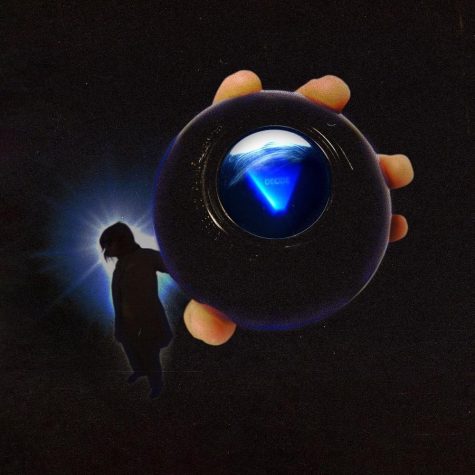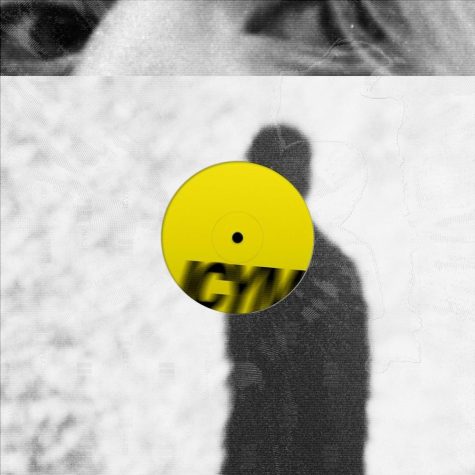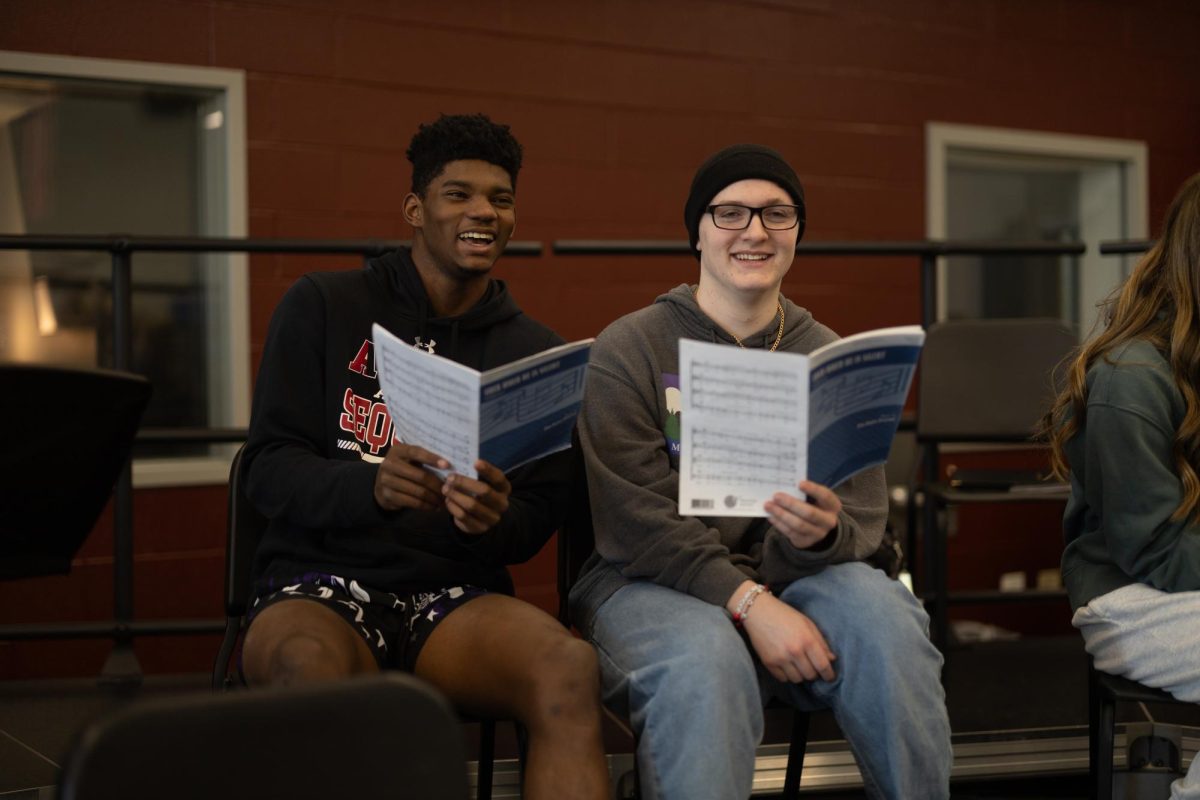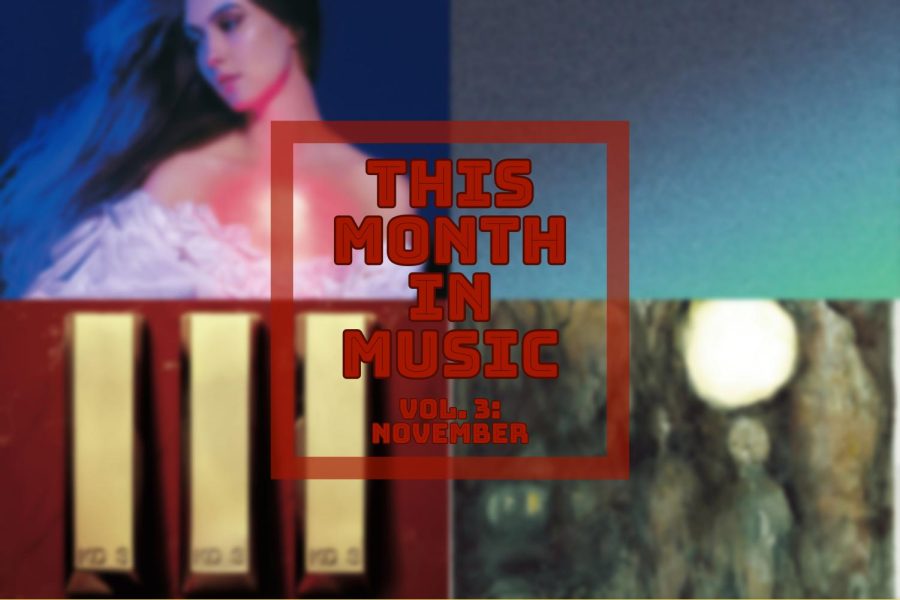DECIDE – Djo

Multi-talented actor and musician Joe Keery, or Djo, delivers a raw tale of growth and change on his sophomore record; DECIDE is an undertaking of nostalgia, oozing with 80s-inspired synth and distorted vocals while encased in a cacophony of ever-changing instrumentation.
Djo quickly grabs attention with the abrupt and loud opening track “Runner,” touching on many of the record’s overarching themes of personal change and existentialism, while battling with the superficialness of social media— a sentiment detailed thoroughly throughout the 13 tracks. Djo’s focus narrows as the punch of track two, “Gloom,” erupts seamlessly with a slew of harsh electric guitar picking and thick bass hits, a furious story commenting on a messy departure from a dysfunctional friendship.
Possibly Djo’s most visceral tale plays out on track five, “On and On.” A bouncing, bassy synth swirls around the background as he drones on about the shallowness and destructiveness that social media promises, the namesake of the track playing into the commentary as Djo observes the toxicity of “scrolling on and on and on.” An epic swelling of the instrumental serves to show Keery’s breaking point, where his pitched-up vocals shine through the chaos, begging the listener to decide: “What’s it going to take to change it? Don’t you want to save this planet?”
Standout track, “End of Beginning,” captures Djo in his rawest delivery yet, stripped of all vocal effects or distortion and crooning over a twinkling set of synth notes—a simple yet fruitful chord progression and drum loop to complement. He feels deeply reminiscent throughout, weaving a tale of nostalgia as he returns to Chicago and observes a past life. All the themes of growth and change come flooding into the forefront as Djo showcases his voice in what is the album’s most memorable chorus. Near the end, Keery recognizes his roots as he repeats the phrase, “you take the man out of the city, not the city out the man,” before slipping into the last chorus, showcasing an intimate shout of vocals to close the track.
Not only has Keery permeated into the mainstream, but his music has also found its way into the halls of Antioch Community High School. Seniors Kiernan Thompson and Caroline Hasik are among the first to spin his newest record.
Thompson rated DECIDE 8.5/10 upon his first listen.
“I was impressed; I think it’s his best [album] yet,” Thompson said. “‘End of Beginning’ is my favorite [song] for sure.”
Hasik awarded the album a slightly more critical 7.8/10.
“I do see a lot of growth and new sounds coming from it, but he is also sticking to his roots,” Hasik said.
Keery continues to improve on his ever-evolving sound, coming into his own voice as an artist on DECIDE. The project in and of itself focuses on growing and transforming as not only an artist but a human as well.
Rating: 7.6/10
Best Song: End of Beginning
Four Songs – Blood Orange

Blood Orange’s— also known as Dev Hynes— latest EP, Four Songs, is exactly what it sounds like: four songs. What the project lacks with its short 11-minute runtime, it more than makes up for in substance. Brief, ethereal and intimate, Hynes delivers deeply introspective lyrics spoken through reverberated whispers, softly floating over equally rich and warm instrumental.
A true track-of-the-year contender, “Jesus Freak Lighter,” erupts into a forceful shock of static, a juxtaposition to the spacey guitar melody that begins to poke through into the front as the buzzing subsides. The instrumental completely morphs with the introduction of a grooving drum loop where Hynes’ soft-spoken poetry phases into the foreground. “Jesus Freak Lighter” consists of only two choruses and an outro— 38 total words— establishing a layer of vague mysticism surrounding the concept and purpose of the track. Perhaps Hynes is dabbling in the abstract; perhaps, the track is a result of random creative impulse. Either way, it is undoubtedly an adventurous listen.
The interior-two tracks, “Something You Know” and “Wish,” continue to build upon Four Songs’ dreamy atmosphere with the implementation of guitar picks wading through a tranquil haze and gently tapped hi-hats that persistently sparkle throughout. Hynes’ echoed repetition proves elusive to decode as he describes sentiments of change and shame from past actions.
Perhaps the most distinctive track on Hynes’ Four Songs is the last; “Relax and Run” sees Hynes’ lyrics in a more focused mood, his delivery untouched by vocal effects and nearly rapping. The track welcomes the EPs only guest spots as Erika de Casier and Eva Tolkin provide both the intro, outro and backing vocals throughout. A common mantra of the track consists of “running away” and escaping a lifestyle described as neverending and full of contempt. It is possible that Hynes finds escape by the end of the project, as the closing lines repeat the phrase “I don’t want to know” before the song’s eventual departure.
Blood Orange does little to explain himself on this project and instead revels in the indefinite. The seemingly simplistic title of Four Songs conclusively does more to describe the project than any one word or phrase possibly could.
Rating: 7.8/10
Best Song: Jesus Freak Lighter
Asphalt Meadows – Death Cab for Cutie

Revered Indie-Rock powerhouse Death Cab for Cutie comes off the back of a string of faltering releases with everything to prove. Not only does Asphalt Meadows quiet the doubt surrounding the trajectory of the long-established band, but it signifies a return to form and presents itself as a record to fit nicely within the prolific discography.
The first three tracks, “I Don’t Know How I Survive,” “Roman Candles” and “Asphalt Meadows,” all encapsulate the spirit of the record neatly and wholly, utilizing guitars drenched in effects and encompassed with a warm amp fuzz, with masterful instrumentation throughout. Lead singer, Ben Gibbard, delivers pained vocals through a radio-like haze, weaving tales of heartbreak, loss and isolation.
According to Genius, Gibbard cites Asphalt Meadows as truly a product of the times, detailing how the band worked on much of the album throughout the COVID-19 pandemic. An extensive amount of Gibbard’s writing can be attributed to the loneliness of self-isolation. Despite the often dark and dreary subject matter, Death Cab never fails to formulate upbeat and catchy melodies, with Gibbard’s voice wading between the finesse of his veteran bandmates.
Death Cab’s most curious song in years presents itself in the spoken-word epic of “Foxglove Through the Clearcut.” Gibbard speaks plainly to the audience, feeling distant from the rest of the song as his voice bounces off the walls of the instrumental. He presents a story through the lens of an observer, speaking to a wandering man. The man shares his experience of the world around him, speaking existentially about the tendencies of man and civilization. By the end, the two men sit together in the clearcut— a land that has been entirely forested— and watch as the forest life begins to reclaim the ruins left behind. A shivering send-off echoes the themes of the track as Gibbard asks, “for what is a funeral without flowers and ten thousand tombstones reaching for the sky?”
Death Cab for Cutie is no stranger to writing tragedy. The triumphs of Gibbard’s experienced songwriting and observations resonate thoroughly throughout Asphalt Meadows as the band’s 10th studio album revives the pace and acclaim that Death Cab formerly celebrated.
Rating: 8.0/10
Best Song: Asphalt Meadows/Foxglove Through the Clearcut
ICYMI – EDEN

26-year-old Ireland native, EDEN, comes equipped with the undeniable talent to weave some of the most mind-invading melodies into his music while at the same time employing complex themes in his songwriting. ICYMI shows EDEN walking through the library of his memories, plucking thoughts off the shelves and placing them into an expansive collage that unfolds throughout the record.
Fittingly, the album opens with a two-minute long poem, spoken within a void of swirling winds and bird songs. The poem creates the foundation for EDEN’s thematic approach to the record, stringing together memories collected from various moments in time. The chaos stirring behind the words slowly swells until the poem is consumed and cut off, delivering the listener to the next track in an abrupt yet seamless transition.
Tracks two through four, “Baling,” “Sci-Fi” and “Modern Warfare,” showcase EDEN as a natural songwriter, traveling through distinct memories on each track while simultaneously producing profoundly catchy anthems. EDEN does not shy away from displaying his voice in all manners of delivery, from monotone utterances to voice-cracking wails. Throughout, his voice competes with the signature glitched-out and unorthodox vocal effects.
The six-minute epic, “Call Me Back,” not only looks back on the past but looks toward the future. The instrumental is in a state of constant morphing as EDEN throws out all semblance of structure and instead opts for a deeply personal and passionate whirlwind that catalogs the turmoil of lost love. The singing slowly devolves over the course of the song from intact to painstakingly shrill as EDEN bursts into a heartfelt belt.
The amalgamation of intense emotional outbursts and reminiscent hums creates a piece that not only represents what has transpired but also what is to come. It is no wonder why EDEN’s memoir-like collage takes the abbreviated name of In Case You Missed It.
Rating: 8.2/10
Best Song: Call Me Back/Modern Warfare





















